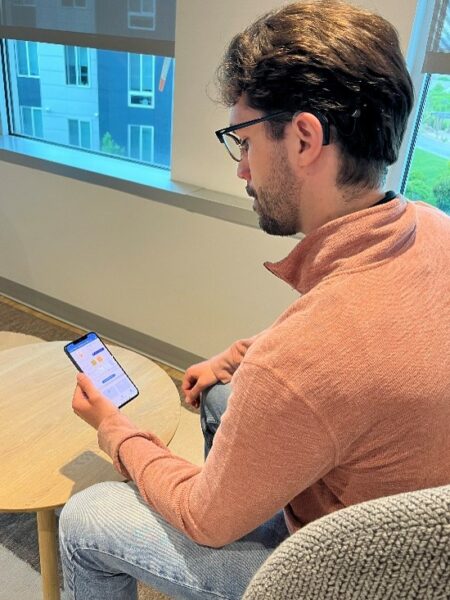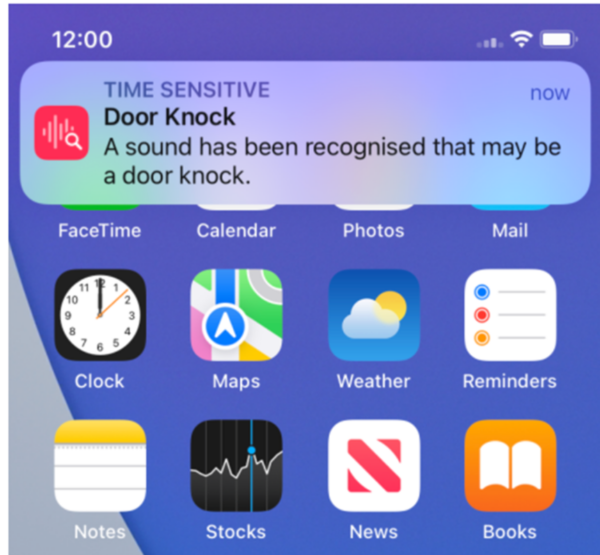Have you tried these mobile apps to boost your listening skills? You might be surprised to find some of your favorite apps can also help you improve your listening skills.
What’s your favorite app? Do you like playing games, watching a favorite TV show or scrolling through your social media feed? There are also loads of mobile apps designed specifically to help you live more confidently with hearing loss.
Self-managing your hearing loss is a key component of successful hearing therapy.1 This is especially important as we don’t have access to hearing health experts 24/7, so we need the right tools to make self-care possible.
By having apps on your compatible smartphone,2 you can use them whenever you have some down time – whether you’re relaxing at home with a cup of coffee or you’re waiting to collect your child from sports practice.
To help you navigate the many apps available, our hearing therapy team has put together this list to help you get started.
1. Practice listening
There are a number of easily downloadable audio book apps to help you practice listening skills. Try Audible™ (a subscription service) to download and listen to stories. BorrowBox™ and OverDrive™ are apps that let you borrow books online from your local library.
Cochlear™ CoPilot3 is a great option if you are looking for a fresh start or interested in reaching some new hearing goals. This app is designed to help you improve your listening and communication skills and to get even more out of your cochlear implant.
TED Talks™ are useful because of the huge variety of topics, voices and accents. All talks have optional captioning which you can follow to support your listening.
i-AngelSounds™ is an auditory training app allowing you to identify environmental sounds, the names of common foods and familiar animals, and monosyllabic words.
2. Cope better with noisy environments and social distancing
Apps that translate speech into text in real-time on your smartphone can be useful in some situations. The accuracy may not always be perfect, but these apps can be helpful to improve communication where noise can make it difficult. Here are some apps to try out.
Google’s™ Live Transcribe™ is an Android™4 app that provides free, real-time, speech-to-text transcriptions to help with everyday conversations. The app can also recognize non-speech sounds and is voice-activated. Live Transcribe shows speech and sounds as text on your smart phone screen.
Notes for Apple® iOS5 Use the Notes app on your iPhone®6 to capture a quick conversation. Open Notes, then tap on the microphone icon to start voice-to-text transcription.
Otter.ai® is available for both Android and iPhone. It is a subscription-based app, but free plans are available.
3. Manage your listening environment
Sometimes background noise can be overwhelming and spoil a social event like dinner out with friends or family.
Apps and online reviews can help you discover venues suitable for people with hearing loss. Try these:
Find customer reviews on noise levels (as well as the food) when choosing a restaurant using TripAdvisor® and Zagat®.
SoundPrint™ is a mobile app that takes a decibel reading and averages a location’s readings so you can view noise levels when choosing a venue.
Brayden, who is a Nucleus® 8 Sound Processor recipient and Cochlear employee, uses the SoundPrint mobile app before choosing a restaurant.
“SoundPrint is a fantastic tool that I use to scope out the sound levels of restaurants and social venues. This allows me to be mentally prepared for heavy background noise. This app also allows me the opportunity to find a place that has the right noise level for me depending on the situation and who I am going out with.”
 4. Safety and sound awareness
4. Safety and sound awareness
iPhone Sound Recognition Alerts™ allow your iPhone and iPad® to alert you to sounds, such as running water, appliances and doorbells. It can also identify shouting voices or a baby crying, and can distinguish between alarms for fires, smoke and sirens.
Android Sound Notifications™ allows your Android phone to alert you to sounds via a push notification, a flash from your camera light, or by making your phone vibrate. Google says Sound Notifications can identify 10 sounds – from sirens and a dog barking to smoke alarms and water running, among others.
Find out more about helpful alerts and alarms here.
To find out more about resources to help to improve your listening skills, visit our Rehabilitation resources.
- Convery E, Keidser G, Hickson L, Meyer C. The relationship between hearing loss self-management and hearing aid benefit and satisfaction. Am J Audiol 2019;28(2):274-284. doi:10.1044/2018_AJA-18-0130
- For sound processor and app compatibility information visit www.cochlear.com/compatibility
- For complete smartphone compatibility information, please visit www.cochlear.com/compatibility
- Android is a trademark of Google LLC. Google Play and the Google Play logo are trademarks of Google LLC.
- Apple, the Apple logo, Apple Watch, FaceTime, Made for iPad logo, Made for iPhone logo, Made for iPod logo, iPhone, iPad Pro, iPad Air, iPad mini, iPad and iPod touch are trademarks of Apple Inc., registered in the U.S. and other countries. App Store is a service mark of Apple Inc., registered in the U.S. and other countries.
- Apple, the Apple logo, Apple Watch, FaceTime, Made for iPad logo, Made for iPhone logo, Made for iPod logo, iPhone, iPad Pro, iPad Air, iPad mini, iPad and iPod touch are trademarks of Apple Inc., registered in the U.S. and other countries. App Store is a service mark of Apple Inc., registered in the U.S. and other countries.


